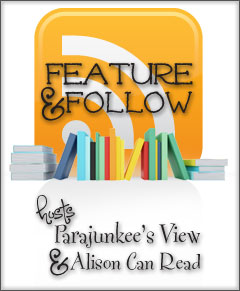It’s an exciting day!
[Why is it an exciting day, Lauren?]
It’s exciting because I discovered that I was selected to be (i.e. volunteered/begged to be) the Feature for this week’s Feature & Follow Friday, hosted by Parajunkee’s View and Alison Can Read! Huzzah!
I’m sorry. I’m not normally quite this cheesy, holding imaginary conversations with myself and all. I do actually yell “huzzah” pretty regularly, though.
Please don’t be sorry you’re following me.
Anyway, to Parajunkee and Alison, thanks so much for hosting and using your powers for good to drive traffic over here to my little blog.
If this is your first time here, welcome! I hope you like what I have to say. And if you’re one of my established followers (or The Elite, as I refer to you in my head), thanks for bearing with me through my rambling.
Follow via whatever method you’d like: email, RSS, LinkyFollowers, Networked Blogs. They’re all over there in the sidebar like a little follow buffet. Be sure to leave me a comment letting me know how you’re following so I can return the favor. If you’re feeling really promote-y, you can also grab my button from the sidebar and put it up on your blog. That would be rad.
BEHOLD, THIS WEEK’S QUESTION:
What is one thing you wish you could tell your favorite author?
Oh my word. *headdesk* This isn’t fair. It’s too hard. I don’t even know who my favorite author is, much less what I’d tell them. Who came up with this question so I can glare at them menacingly?
[glares at Ali]
*sigh*
Okay, step one is picking my favorite author, which is not so easy. Some of my favorite books are written by authors who have only written a couple books, or only one series. So how do I know if I like everything they write or just that small sampling? Some of my favorite books are written by authors who have written other books I didn’t like, so I guess that means they’re not my favorite authors. And how do I compare authors who write adult sci-fi to authors who write YA fantasy? Both are genres I love, but it’s apples and oranges.
You know what? Screw this. I’m not picking my favorite author. The question doesn’t actually say I have to reveal who my favorite author is, and in the spirit of living by the letter of the law (that’s an oxymoronic statement if there ever was one), I’m not going to. Let’s just say there is a whole slew of authors that I adore and whose brains I would pick to smithereens if I could.
(Can you pick something to smithereens? Let’s just assume that’s a thing).
They include J.K. Rowling, Lauren Oliver, Orson Scott Card, Robin Hobb, Suzanne Collins, Myra McEntire, Michael Crichton, and probably many others that I’m forgetting. I love the stories they tell, the characters they introduce, and the worlds they create; but what’s more, I love the way they use words to accomplish this. Lots of books can be enjoyable and have good characters and an interesting story, but not all are actually written in a way that draws me into the world. I don’t always care about the characters I read about. I don’t always feel immersed in the world they live in. I don’t always put down a book wondering what happened next, even though I know the characters aren’t real.
But these authors have all created worlds and characters that I miss when I finish the book. I wonder about them. I care about them.
So to take the question literally, “what do you wish you could tell your favorite author,” there’s actually not much I’d want to tell them, besides “You’re awesome.” But that’s probably nothing they haven’t heard before.
If I can modify the question slightly to “what do you wish you could ask your favorite author(s),” I would ask them, how do they write characters and worlds in a way that makes me care? How do they get inside their characters’ heads? How do they write a world that completely absorbs my senses? (I know, that looks like 3 questions, but it’s really just one: “How do you make readers care?”)
Maybe it’s just one of those intangible gifts, where there is no technique; it just comes naturally to them. But if there is a method to their glorious madness, I would like to know what it is.
Thanks for stopping by!






